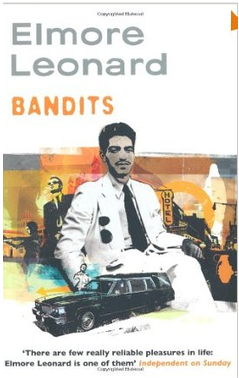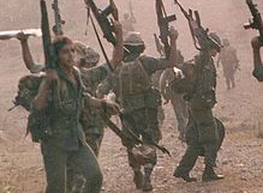|
Following his excellent review of 'The Two Faces of January', I'm delighted to welcome back Michael Nutt as a guest blogger. Today's post will be a review by him of Elmore Leonard's 1987 novel 'Bandits'. The floor's all yours, Michael... Snappy dialogue and interesting characters...  Written during a period when Elmore Leonard was turning out some of his very best crime fiction, 'Bandits' (1987) is written with the author's customary ease and economy, full of his snappy dialogue, a cast of interesting characters, and a plot that picks up pace along the way. The story begins with a corpse, in a place where death is everyday business. We are in a mortuary in New Orleans and two men are working on a road traffic victim. The scene is set with some rapid fire dialogue between the two men as they work on the body. Or rather while one man works on it, while the other watches evasively. The evasive one is Jack Delaney, just turned forty, a one-time fashion model who ended up doing time in Angola penitentiary for burglary, and now working for his brother-in-law Leo Mullen who got him an early release through the rehabilitation programme by offering him a job as assistant in his funeral director's business. It is clear from the start that Jack has not put his criminal past completely behind him. First there is the body that has appeared that day on the mortuary slab, and which Jack recognises as an acquaintance from his wild years. Then there is the revelation that he has been socialising with red-headed Helene, another character from his criminal past. A scathing comment on US foreign policy  The leprosarium at Carville The leprosarium at Carville Soon Jack is on his way to the leper colony in Carville in the company of a nun, Sister Lucy, only the body they are going to collect in the hearse is not a dead one. And Sister Lucy, in her Calvin Klein jeans and heels, appears very well-attired for a woman of the cloth. This is a slow-burner by Leonard's standards and the story takes a while to ignite. The plot has a conventional, linear structure - very different to the author's usual cross-cutting chapters that leap between characters and locations before bringing all the strands together. Written in the late 1980s, Leonard draws on the wars of Central America of the late 20th century - the conflicts in Nicaragua, Honduras - as a background to the contemporary story, introducing themes of responsibility and morality that have been lacking in Jack's life. There is more than a touch of bitterness in the way Leonard remarks on the USA's involvement in those dirty little wars in Central America. He does not spare his American readers the uncomfortable truths of US foreign policy and how it supported the most vicious and inhuman parties in those struggles. Leonard is angry, very angry, as he writes of the atrocities the US financed in Nicaragua in the name of anti-Communism. An unlikely wild bunch  Nicaraguan contra militia Nicaraguan contra militia The bad guys are often the most interesting characters in Leonard's crime novels and he keeps us waiting to meet the villain of this story. Bertie - Colonel Dagoberto Godoy Diaz - is an officer who served the deposed Nicaraguan dictator Somoza and he has a personal interest in the girl that Jack and Lucy have taken out of Carville. He is on their case, while visiting the States to raise funds for his army of contras still fighting the Sandinista government in Nicaragua. Lucy's father, a wealthy oil tycoon, could be just the man to help him. It is almost a third of the way into the story before we meet Colonel Diaz and we are left in no doubt about what Jack and Lucy are up against. The Colonel has the CIA and some smooth operators working on his side and Jack is going to need help from some people from his criminal past, so he calls on a couple of bandits: ex-cop Roy Hicks, whom Jack knew in Angola, and old lag Tom Cullen, recently released from a 27 year stretch into the care of a nursing home. This unlikely wild bunch have a chance of redemption, of using their criminal skills for the force of good against evil. But with their criminal backgrounds, will they stay as the good guys or succumb to the temptation of more than two million dollars? Take a trip in Jack's hearse  Beautiful New Orleans Beautiful New Orleans I love this novel's New Orleans setting, the familiar street names and locales. I love the anecdotes that Leonard drops in to fill out the main characters' back-stories, each one a short story in itself. I love the way that Leonard will follow a plot thread and character for a while before leaving it and moving off in an entirely different direction. I love how this leaves the story open to so many possibilities, not just with the bandits' quest to steal the Colonel's funds but also in their relationships with each other. The story builds to its climax, with some twists and turns along the way, raising our anticipation like watching a car bomb primed to go off. It ends as it begins, with a live body being transported in a hearse. But we have come a long way in between, and so too have his characters. 'Bandits' is not up there with Leonard's best novels, but it is a thoroughly good read. Take a trip in Jack's hearse: it is a journey worth taking. More about Elmore Leonard  Novelist Elmore Leonard Novelist Elmore Leonard Thank you, Michael, for another great book review! A few facts about the novelist Elmore Leonard. Born in New Orleans in 1925, his family moved to Detroit in 1934, where he spent much of his life. His earliest novels, published in the 1950s, were Westerns. He went on to pen several crime and thriller novels, the best known of which include 'Get Shorty' and 'Rum Punch'. Many of these, including 'Bandits', have been made into films and adapted for television. During his lifetime, Leonard was awarded various prestigious literary prizes, including the Grand Master Edgar Award in 1992 from the Mystery Writers of America, and the F. Scott Fitzgerald Literary Award for outstanding achievement in American literature in 2008. Elmore Leonard died in 2013, aged 87.
0 Comments
Leave a Reply. |
Categories
All
Subscribe to my blog!
Via Goodreads
|
Join my Special Readers' group and receive a free copy of 'Blackwater Lake'!
|
Privacy policy Website terms and conditions of use
Copyright Maggie James 2018 - current date. All rights reserved.
Copyright Maggie James 2018 - current date. All rights reserved.
 RSS Feed
RSS Feed
